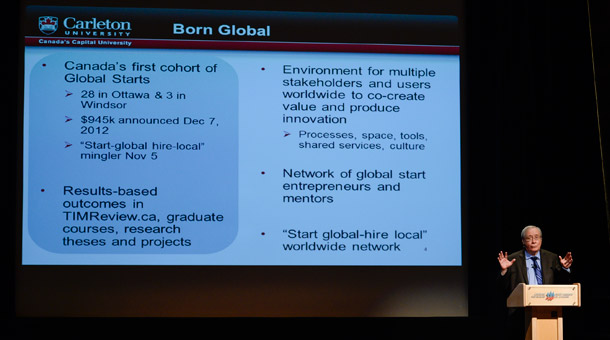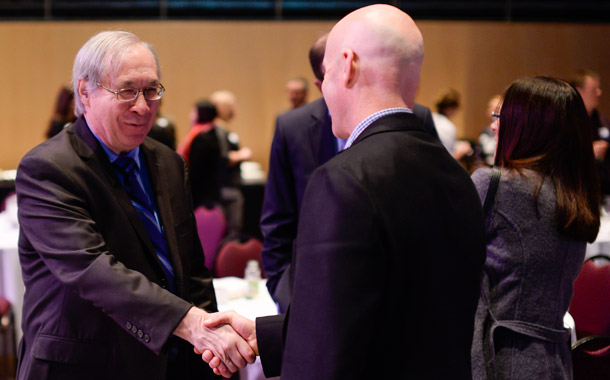Thinking globally is now a must for entrepreneurs
Five years ago, technology entrepreneurs had a choice about whether or not they wanted to focus their business in a local market before expanding globally.
Today that option doesn’t exist, according to Sprott professor Tony Bailetti, who spoke about why global starts change everything at the third Sprott Topics Speaker Series event Nov. 19.
“You either start with a global model, otherwise somebody that has a global model who’s based in Singapore is going to be competing with while you decide to go global or not,” he said.

Tony is the director of Carleton’s Technology Innovation Management (TIM) master’s program and founder of Lead to Win, a business development program that helps entrepreneurs establish and grow businesses in Canada’s National Capital Region.
To better understand global starts, Tony and colleagues in the TIM program created an experiment to learn how going global works.
The experiment involved 31 technology startups, with 28 in Ottawa and 3 in Windsor, Ont., and to achieve a truly global mindset, they connected tech entrepreneurs with new Canadians.
“The idea was to put them in a room, shake the box and see what happens,” Tony said.
It was from this experiment that the first cohort of global starts in the country came to be.
Tony said that going global from inception offers numerous advantages to companies.
“Investors will pay more for companies that sell outside their home markets, there’s no question about that,” he said, adding that they also perform better financially, have access to more markets, and create more jobs.
He said the conventional approach of creating a company for a local market before rolling it out to national, then international markets, is just too slow, too risky and too expensive in terms of time and resources.
By making the people they work with develop a global-first business model, Tony said that they found the mindset of the entrepreneur changes completely.
“The first thing that we noticed was that when you told these entrepreneurs that they had to go global, after their hearts recovered from the shock, they think a lot more aggressively,” he said.
Tony said their approach to things like product features and how a business can scale is radically different and is reflected in their business models. The problem they are solving has to be “crystal clear and globally present”.
“They come back with something based on more than gut feeling.”

Earlier this month, the first cohort of global starts was shown to crowd of 125 people, with entrepreneurs introducing 31 companies designed from inception to take on the global market.
“It had to be one of the proudest moments of my career,” Tony said before recounting an email from one of the presenters who could not be there that evening.
“They wrote, ‘Hopefully you will forgive me for not being with you tonight celebrating the first cohort, but I’m really busy in California because I just sold my business to Google,’” he said “So I wrote him back saying ‘That’s no excuse, you should have been here!’” drawing a big laugh from the crowd.
With the first cohort of global starts ready to move on and continue to grow, Tony said the plan now is to create a national program to bring the lessons learned in Ottawa to cities across Canada.
“Wherever the energy, mindset and talent exists, they will be able to leaver what we’ve learned at Carleton,” he said.
Locally, the Lead to Win program will continue supporting entrepreneurs but with the added caveat that they must now plan to be a global start.
Though going global is certainly not an easy task for a budding entrepreneur, Tony said by adopting that mindset from the beginning offers the best chance of success.
“I’m a big believer that if you want to learn something, you must jump in and do it,” he said. “Entrepreneurship and going global are each one of those things.”
For more information about global starts, read about them in the TIM Review.